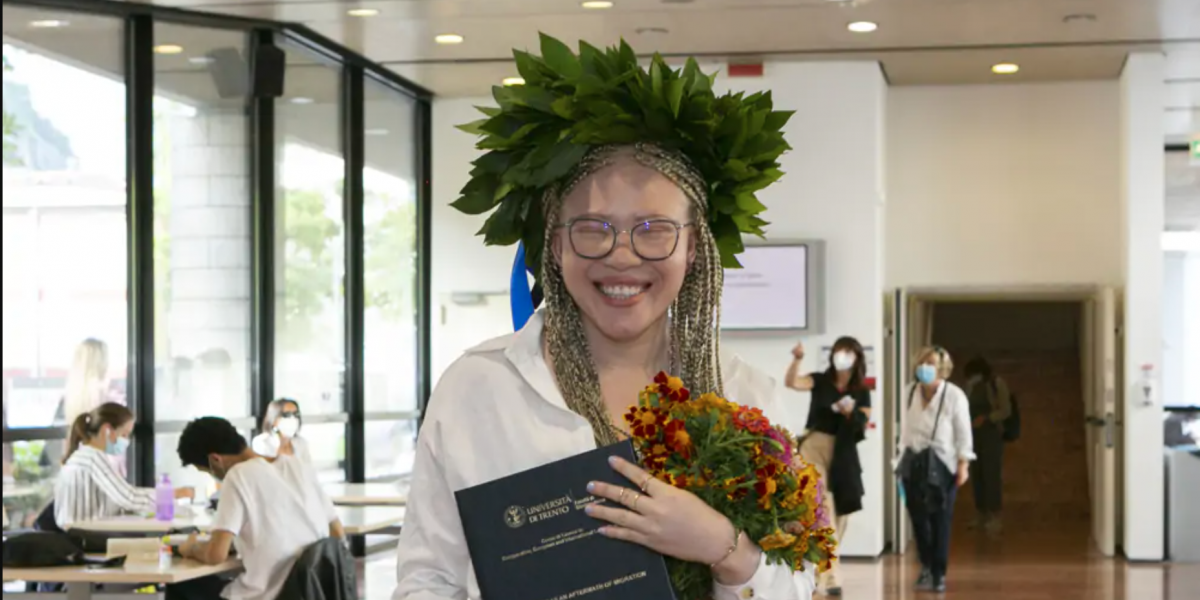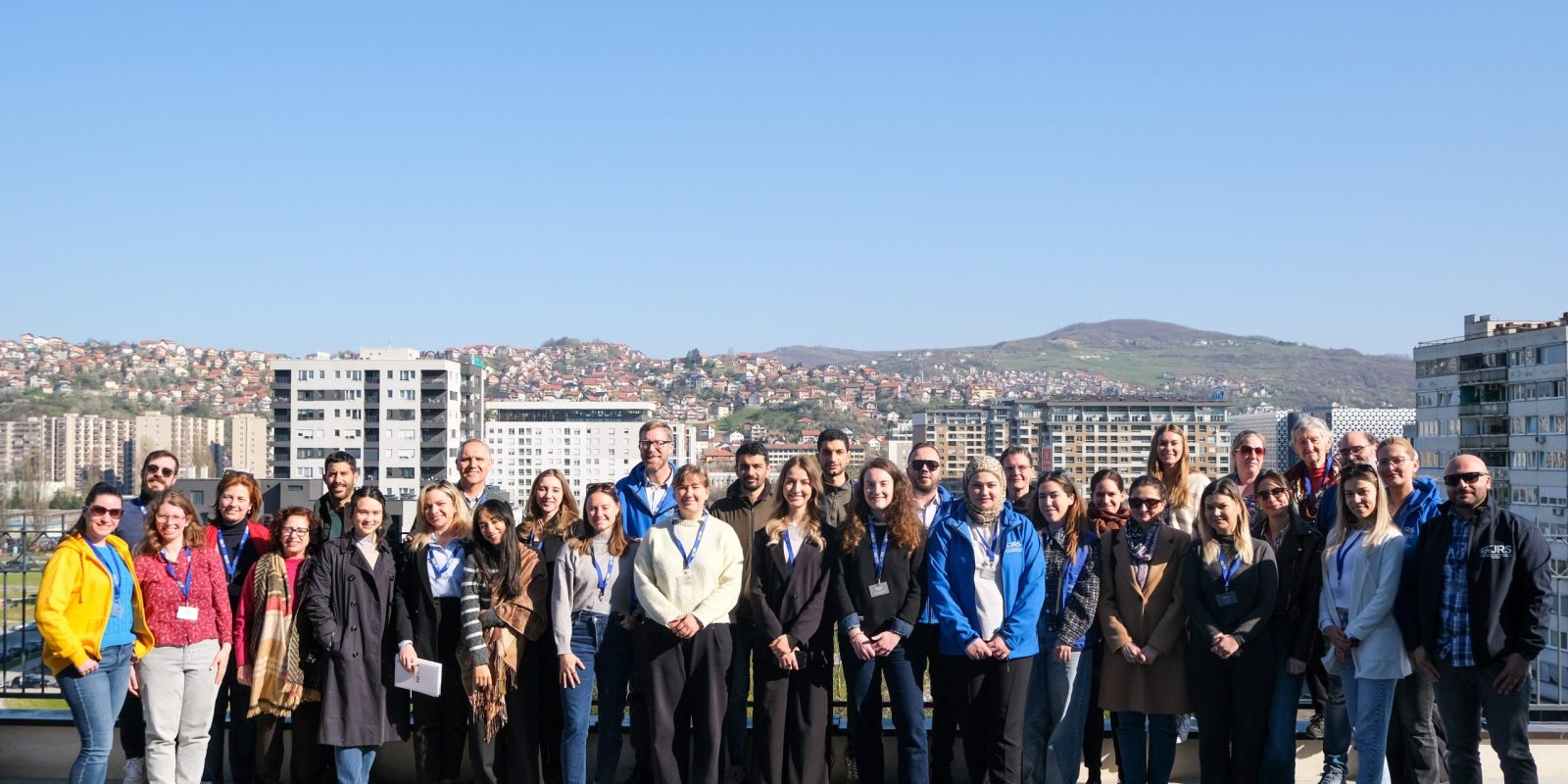From a reception centre to a degree in Law: Joy, the young refugee with big plans for the future
03 December 2021

Joy arrived in Italy in 2016. With the support of Centro Astalli – JRS Italy, she enrolled in university on a refugee scholarship, and this summer, she graduated with a Bachelor’s degree in Comparative European and International Legal Studies. Graduation is always a good reason to celebrate, but for Joy, it also marked the end of a journey spanning from Nigeria to Libya, through to Trento. Today, Joy chooses to share her story, hoping to shed light on the reality of migration.
Joy suffers from albinism, and in her native Nigeria, people with albinism are the subject of persecution. In 2016, she was kidnapped and forced into ritual violence before being brought to Libya, where she was sold to men who buy young girls to use them as sex slaves . She managed to escape, enduring the dangerous journey across the Mediterranean that so many people attempt daily, eventually landing in Lampedusa. On the 31st July 2016, she took her first steps on Italian soil.
The first days in Italy felt like being pinged around a pinball machine: detained in Sicily, fingerprinted, registered, then propelled to a reception centre in the Alpine city of Trento. Throughout this process, she was in the dark about what exactly was happening to her.
“I didn’t even have time to realise where I was or what I had to do. For the public authorities, I was no more than a number. One day they just put me on a 10-hour bus to the other side of Italy, to a town I had never even heard of. I found myself in a crowded reception centre, sharing a tiny room with strangers.”
For months, Joy remained in a state of shock. Terrified at the prospect of deportation and still processing years of trauma, she followed every instruction to the letter. At the same time, she withdrew into herself, barely able to speak.
“At that moment I was blocked. I just did all that they told me, I didn’t ask questions. My greatest fear was that, if I did something wrong, they would send me back. They told me that I had to apply for asylum, and I did; then they told me my asylum application was under review, and I just had to wait.”
‘You have to wait’. This sentence would follow Joy’s for years, through every review of her application, while her life stalled, at the mercy of public bureaucracy. No way of knowing when all this waiting would end, when she could finally leave the reception centre.
But thankfully, she did not ‘have to wait’ alone. In Trento, she was introduced to Centro Astalli – JRS Italy. Through them, she was assigned a caseworker. She received legal support and medical aid, attended Italian classes — and, crucially, attended regular therapy sessions with a psychologist. Gradually, she started to open up and in this newfound safety, took control of her life again.
“I am grateful to JRS, to the volunteers and social workers who were there every day to accompany me in the process, through all those things that did not make sense. They did not ask me to explain myself, they did not force me to do anything: they were just there, to help me, when I felt ready. And so I trusted them.”
In 2018, she was granted refugee status and a 5-year residence permit. Around the same time, the University of Trento launched an ambitious refugee scholarship programme, covering school fees for three years, plus extra support for the entrance exam. With the support of her caseworker, Joy applied.
When she got the grant, she was ecstatic. Despite everything, she considers herself one of the lucky few. Most migrants, regardless of academic background or skill, are unable to access higher education due to few scholarships, short visas, and complex requirements. In the end, they’re forced to give up their studies and take up so-called “low-skilled” jobs.
The Jesuit Refugee Service’s help was fundamental to Joy’s journey. She could lean on JRS’s social workers and volunteers while she regained the confidence she needed to take her next steps forward. The all-around reception service turned the long wait into time she could use to settle and find her footing.
This type of quality reception, which includes individual accompaniment and proximity with the community, is what makes the difference in the way the displaced person settles in the new country. Instead, EU Member States including Italy increasingly choose to invest in large centres in remote areas, limiting services to basic accommodation and food. This impairs the ability of migrants to integrate into the new society as empowered individuals.
“JRS staff became my family. In those years of waiting, they helped me build the foundations for my university career: I learnt Italian, I worked as a cultural mediator, and generally, I started to believe in myself again. Without them, I would not be where I am today.”
Now, Joy can hold her head high and look ahead — and she has big plans for the future. Soon, she’ll move to Milan to begin her Master’s in Global Politics, and in the long term, she wants to enter politics. Her dream is to help people like her find a voice and make themselves known in Italy’s political arena, fighting again the systemic racism which constricts refugees and non-white Italians daily.
“I want to make a positive contribution to Italy, this country that I now consider my home, and to Europe and the world. I want to tell everybody that they should not be afraid of those who are different: we are all different, and only if we learn to welcome diversity in our life, we can create a richer and happier society.”

